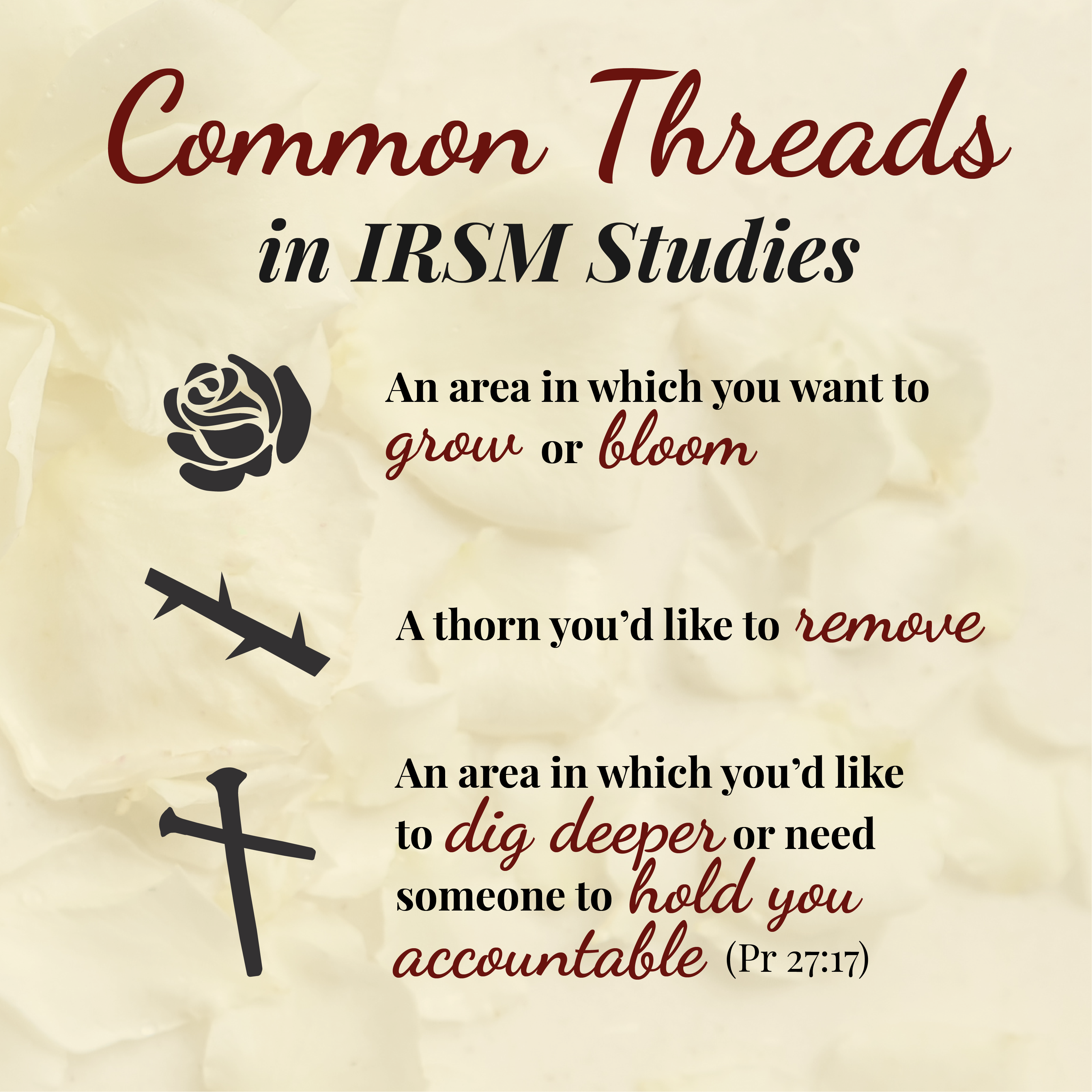-
Committed to My Iron Rose Sisters
 Written by Katie Forbess, volunteer and Board President with Iron Rose Sister Ministries in Missouri
Written by Katie Forbess, volunteer and Board President with Iron Rose Sister Ministries in MissouriAs iron sharpens iron,
so one person sharpens another.
Proverbs 27:17Looking at past blogs on the IRSM website which I have written or been a part of, I see the foundation of the notes that I have been writing for this blog. It is a comforting reminder that God has been working consistently in the same ways through my commitment to Iron Rose Sister Ministries through relationships, prayer, and reliance on Him.
If you ask me how I am most committed to my Iron Rose Sisters, I will tell you it is in prayer. Why? Because all other things I do have the possibility of failure. Someone won’t like the words or scripture I share or the gift I have chosen. I will let them down with my overwhelming humanness. But through prayer, God uses my holiness to bless them. The Spirit intercedes for them as He does for me. With all the groans and lack of words, He communicates the soul's cry to the Father.
Actions are a must. Listening and following through on the Spirit’s promptings to act are essential (Called to Listen and Committed to Listen books). And the way that I know I can best help someone is to bring them to the Father in prayer.
Prayer is an awesome testimony of love. Recently, a prayer line that I am on spent the whole time praying for a fellow sister who was a caregiver. One of the most amazing things to listen to was other sisters who I know are also caregivers holding up this sister in prayer. For an hour. Prayer after prayer. Some in the form of songs, others through readings of the scripture. A few laughs and a whole lot of tears.
This also happens during the weekly team meetings of Iron Rose Sister Ministries. The meeting begins with a devotional, and prayer is always included; not a general prayer, but a prayer that inserts our lives into the lives of others and presents our hearts before the Lord, always asking in confidence, trusting He not only hears us, but He is in control.
These kinds of relationships are the foundation of IRSM and the goal to grow closer to God and one another. Through moments like these, the team is prepared to make important decisions like the very difficult one made recently to cancel a trip. The trip was planned and prayed over, the events set up, and invitations sent out. Michelle and Julia were prepped and ready. The Spirit was willing but literally, the flesh could not make it. The unity of the team and the trust on all sides that the decision was being made for God’s glory was not easy. But it worked out and the team was amazing in their response to all the things that had to be done, from the refunding of tickets to the communication with the congregations. After countless prayers and some tears, it was evident. God blessed the process.
This is only one example, and I will say with confidence that as the team and ministry grow, the stories grow, as does our faith through our time in prayer.
So, if you want to know how to be committed to your Iron Rose Sisters, my answer is prayer. If you want better relationships, pray. If you want to truly help the sister who just lost her husband, pray. Please do not hear me say that prayer is a magic incantation and that no other action is involved. At the very least God will change your heart, but it’s more likely that He will change your perspective about what action needs to be taken.
Praying always.
-
Committed To One Another
 Written by Rianna Elmshaeuser, volunteer with Iron Rose Sister Ministries in Colorado
Written by Rianna Elmshaeuser, volunteer with Iron Rose Sister Ministries in ColoradoLet us hold unswervingly to the hope we profess, for he who promised is faithful. And let us consider how we may spur one another on toward love and good deeds, not giving up meeting together, as some are in the habit of doing, but encouraging one another—and all the more as you see the Day approaching. (Heb 10:23-25 NIV)
The New Testament has five verses that mention “good deeds,” and four of those are in 1 Timothy. Paul instructs women to be more concerned about adorning themselves with good deeds than the latest fashions (2:9-10), the rich to be rich in good deeds rather than trusting in their material wealth (6:18), and that good deeds, like sins, will be found out eventually, both the obvious and not (5:25). First Timothy 5:10 provides some examples of good deeds: bringing up children, showing hospitality, washing the feet of the Lord’s people, helping those in trouble, and being devoted to all kinds of good deeds.
Verses 24-25 in Hebrews 10 grammatically suggest that the opposite of spurring one another on toward love and good deeds is giving up on meeting together. Anyone who has gone to the same church for more than a few years knows that where there are people, there are problems. None of us is perfect, so we sometimes hurt each other accidentally or out of selfishness, or because we ourselves have been hurt. Hebrews is a call to not give up on each other, but to continue in good deeds and to love one another as Christ loved us.
Some of the most bonding experiences with my fellow saints have been when we were out in the world doing good deeds and working for the Lord. We did not have time to squabble about someone getting in someone else’s lane or how so-and-so should have done things this way instead. There was simply such an overwhelming amount of work to be done and people to serve that no one got in each other’s way.
Perhaps the author of Hebrews is instructing the church not to lose the mission of seeking and saving the lost. In America, it is easy to become consumers within our congregations instead of serving others. The list in 1 Timothy covers serving the Lord’s people and those in trouble. Who is in more trouble than the lost? We also tend to hide our own troubles, hurts, and problems from each other. If we only knew the pain and suffering going on within our congregations, suddenly the arrangement of classroom chairs wouldn’t seem as big of a deal. I have a friend who runs a shoe-shining business. Her business has been successful for many years, and she says it’s because she trains her employees to listen to the customers while they are shining their shoes. Her customers are CEOs and high-powered people who frequently find themselves in tears because someone has taken the time to listen to them and care about their day.
The list of deeds does not include handing someone money. When we are doing good deeds for the Lord’s people and the lost—washing their feet, helping to bring up their children, and showing hospitality—these things take time. Even when you get hurt, rather than quitting and finding another church, it is so important to keep doing good deeds and loving each other. We need to keep spending that time, taking time to listen to each other’s needs, and working out our problems.
The message of the world when someone hurts you or offends you is to say, “I deserve to be treated better,” and to leave that relationship, job, or whatever. We, as aliens and strangers in this world, are called to a different response. Do not leave, do not give up meeting together. Instead, awkward as it may be, keep meeting together, keep encouraging each other, and keep doing good deeds together or for each other. It is when we give up that the enemy wins. What is sweeter than the restoration of a friendship when you thought you had lost a friend forever because you messed up? So often Christians focus on commitment in a marital context, but commitments to friendships, to family, and to the brothers and sisters in Christ’s church are just as necessary if the work of God’s Kingdom is to continue. It is not an easy path. Commitment rarely is. But Jesus called us to be set apart for Him— to be different than the world. Continuing to encourage each other and love each other makes us radically different than the world. I pray that we will all make this commitment.
-
Committed to One Another: Getting to Know the Common Threads
 In the context of small groups or trios of women, we have an opportunity to participate in authentic, genuine relationships that can deepen our relationships with God and one another. Iron Rose Sister Ministries prays that we can equip you in those relationships, especially in your local churches and small groups. And one of the ways we do that is represented by the Common Threads— the three elements of the ministry logo. They are a way of making any Bible lesson very personal and practical: the sermon on Sunday mornings, your personal Bible reading, or your favorite chapter in an Iron Rose Sister Ministries Bible study book.
In the context of small groups or trios of women, we have an opportunity to participate in authentic, genuine relationships that can deepen our relationships with God and one another. Iron Rose Sister Ministries prays that we can equip you in those relationships, especially in your local churches and small groups. And one of the ways we do that is represented by the Common Threads— the three elements of the ministry logo. They are a way of making any Bible lesson very personal and practical: the sermon on Sunday mornings, your personal Bible reading, or your favorite chapter in an Iron Rose Sister Ministries Bible study book.The Rose in The Common Threads
The bloom of the rose reminds us that we are all beautiful and unique roses in God’s Garden. It represents the areas in our spiritual lives in which we long to bloom or flourish.“…making it bud and flourish… so is my word that goes out from my mouth…” (Isa 55:10-11).
The Thorn in the Common Threads
The stem represents the thorns we identify and want to remove. They may be thorns like Paul’s (2Co 12:7-10) that torment us, or they may be sin struggles that hinder our growth.“…a thorn in my flesh to torment me… throw off the sin that so easily entangles…” (2Co 12:7-10; Heb 12:1)
The Iron in the Common Threads
Iron Rose Sisters, as shown in the form of the cross, lovingly serve as iron sharpening iron, as God transforms us into the image of Christ, and as we deepen our relationships with God and one another.“As iron sharpens iron, so one person sharpens another.” (Pr 27:17)
-
Compassion Implies Action
 Written by Kara Benson, volunteer with Iron Rose Sister Ministries in Alabama
Written by Kara Benson, volunteer with Iron Rose Sister Ministries in AlabamaPraise be to the God and Father of our Lord Jesus Christ, the Father of compassion and the God of all comfort, who comforts us in all our troubles, so that we can comfort those in any trouble with the comfort we ourselves have received from God. (2Co 1:3-4 NIV)
The Creator of the entire universe is described as the “Father of Compassion”; how beautiful and comforting! However, what exactly is compassion? In Hebrews 1:3a, we read that “the Son is the radiance of God’s glory and the exact representation of his being.” Therefore, we can examine the life of Jesus to understand the nature of compassion.
In the gospel of Matthew, Jesus travels through towns and villages, “teaching in their synagogues, preaching the good news of the kingdom, and healing every disease and sickness” (Mt 9:35). Jesus had compassion on the people He saw. He healed a leprous man (Mt 8:3), two blind men (Mt 20:29-33), sick members of a large crowd (Mt 14:14), and provided food for 4,000 hungry people (Mt 15:32). In the account of Jesus healing the two blind men, some versions say that Jesus was moved with compassion. When Jesus felt sympathy for others, He did something about it. From Jesus, we learn that compassion implies action.
As disciples of Christ, we are called to follow in His footsteps (Mk 8:34-35). We are to willingly lay aside our sin and self-absorption in the pursuit of Christ, following His example of being moved with compassion. Jesus declares, “Whoever serves me must follow me; and where I am, my servant also will be. My Father will honor the one who serves me” (Jn 12:26). According to the picture painted in scripture, compassion is clearly a central part of our commitment to serving Christ; it is even the basis for the separation of the sheep and goats on judgment day. Carefully consider this critical scene:
When the Son of Man comes in his glory, and all the angels with him, he will sit on his glorious throne. All the nations will be gathered before him, and he will separate the people one from another as a shepherd separates the sheep from the goats. He will put the sheep on his right and the goats on his left. Then the King will say to those on his right, “Come, you who are blessed by my Father; take your inheritance, the kingdom prepared for you since the creation of the world. For I was hungry and you gave me something to eat, I was thirsty and you gave me something to drink, I was a stranger and you invited me in, I needed clothes and you clothed me, I was sick and you looked after me, I was in prison and you came to visit me.” (Mt 25:31-36)
Subsequent verses explain that when we show compassion by fulfilling the needs of the least of Jesus’ followers, we are effectively serving Jesus himself. Let us contemplate the eternal value of exhibiting compassion.
The apostle Paul writes,Therefore, as God’s chosen people, holy and dearly loved, clothe yourselves with compassion, kindness, humility, gentleness, and patience. Bear with each other and forgive whatever grievances you may have against one another. Forgive as the Lord forgave you. And over all these virtues put on love, which binds them all together in perfect unity. (Col 3:12-14)
How can we show compassion by our actions?
- Volunteer at a pantry
- Drive someone to their doctor’s appointment
- Prepare food for someone who is sick, grieving, or a new mother
- Fervently pray for someone throughout the day
- Provide a listening ear for someone who needs comfort
- Help someone pack, unpack, or clean their house
- Humbly address unrepentant sin in a sister’s life that is endangering her soul
- Visit someone in the hospital, recovering at home, or lonely
- Forgive someone. Scripture frequently presents compassion and forgiveness together, indicating a connection between the two. As Ephesians 4:32 instructs, “Be kind and compassionate to one another, forgiving each other, just as in Christ God forgave you.”
A hard-working sister in our congregation is a good example of a compassionate Christian. She invited me to volunteer alongside her at a food pantry, woke up hours before sunrise to take me to an outpatient procedure, teaches children’s Bible classes, and regularly helps aging and disabled church members who need assistance. She can almost always be found doing something for someone. Her compassion reminds me of my favorite verse: “God is not unjust; he will not forget your work and the love you have shown him as you have helped his people and continue to help them” (Heb 6:10).
Compassion implies action. How can you show compassion today?
-
Confess to Rebuild
 Written by Vivian Arcila, volunteer with Iron Rose Sister Ministries in Canada
Written by Vivian Arcila, volunteer with Iron Rose Sister Ministries in CanadaListen to my prayer! Look down and see me praying night and day for your people Israel. I confess that we have sinned against you. Yes, even my own family and I have sinned! (Ne 1:6 NLT)
The book of Nehemiah not only sequentially details the biblical way to resolve conflicts and crises but also highlights the importance of confessing sin as an essential part of restoring our relationship with God.
It is interesting that when Nehemiah learns of the situation in Jerusalem and its captives, the first thing he mentions in his prayer is confession, not only of his personal sin but also of his family and his nation. He knew that the disobedience of the people of Israel had resulted in their destruction, and he felt responsible as well. Since ancient times, we have noticed that sin that is not corrected and is practiced deliberately can affect not only the person who commits it but also their family and even an entire nation.
Psalm 14:3 says, "But no, all have turned away; all have become corrupt. No one does good, not a single one!" As a God-fearing man, Nehemiah was aware that, although his works were pleasing to God, the human being is a sinner by nature. Nehemiah may have felt that he could have done more for his people before things got worse, but the truth is that confession is an essential part of our Christian lives.
Our walk in Christ begins with acknowledging that we have sinned before Him, repenting of our sins, and confessing Jesus as our Lord and Savior, which is confirmed with baptism and perseverance. Romans 10:9 says, "If you openly declare that Jesus is Lord and believe in your heart that God raised him from the dead, you will be saved." The doors of spiritual blessings begin to open with confession.
However, confession does not get stuck at the moment when we give our lives to Jesus. It should be a daily act to recognize Christ's lordship and discover our faults. In the face of every difficult situation, we must examine ourselves and confess our offenses to our Creator. In that moment of reflection, think about how much our personal sin has affected the family and, in some way, the community or society, and confess before God our participation in it, either directly or indirectly. It is not only sin to do evil to our fellow men, but also to fail to do good as James 4:17 says, "Remember, it is sin to know what you ought to do and then not do it."
Am I studying the Bible, praying, examining myself, and confessing my sins frequently? That helps me connect to God and cultivate a meek character that my family, church brothers and sisters, neighbors, drivers, people at the grocery store, and coworkers will notice. Not having good communion with God affects us personally because we lose peace, which is reflected in the treatment of our relatives and neighbors, causing a domino effect on the individual, family, church, society, and the whole world.
Let's try to make an effort daily in our relationship with God because it impacts, in one way or another, the life of our family and the lives of the people around us. Before we met Jesus, we were like a city with walls destroyed by sin. Now, we are being built on the rock that is Christ.
-
Created to Create
 Written by Michelle J. Goff, Founder and Director of Iron Rose Sister Ministries
Written by Michelle J. Goff, Founder and Director of Iron Rose Sister Ministries“I never realized that God gave me my love for decorating as a reflection of His attention to detail and decorating, like in the temple and the curtains.”
A sister in Houston shared this revelation after a lesson I presented exploring the significance of the extravagant and huge curtain that hung between the Holy Place and the Holy of Holies in the temple. A handbreadth thick when it was torn at Jesus’ death on the cross, for God, it was more like a simple rip of a piece of thin paper.
Our God is Mighty. Our God is Merciful. Our God is Spirit. And our God is Creator.
Created in His image (Gen. 1:27), when we dwell in His Spirit and live as He has designed us to live, we can be mighty, merciful, Spirit-filled, and creative!The fruit of the Spirit does not list creativity as a facet of His fruit (Gal. 5:22-23), yet I want you to take a moment and reflect on a time in which your creativity flowed in a way that could only be described as “inspired.” Where did that inspiration come from?
Makoto Fujimura, in his book Art and Faith: A Theology of Making, proposes that one of the most divine ways for non-believers to be introduced to God is through the arts. As Maker, God made us to make. As Creator, He created us to create. It is in that moment of creative making that we can build an in-depth connection with our Creator through His Spirit. Are we open to that? Do we recognize that opportunity?
Artists or “creatives” are more than just painters or sculptures. Some artists are culinary. Others are good with their hands and have a good eye for things like a seamstress or women who can “up-cycle” recycled items to design beautiful constructs.
My medium is words—a monologue, a poem, a Bible study, a lesson, a conversation, a song, or an expression. However, the best words have been creatively crafted by inspiration of the Holy Spirit and are not my own.
Bezalel and Oholiab (Ex. 31) were gifted in all kinds of craftsmanship. Kathy makes jewelry, Juana makes soaps, and Jocelynn makes lasagnas. Wendy creates websites, Molly creates spreadsheets, and Teresa creates connections. Jennifer designs curriculum, Mandy writes songs, and Pam gifts crocheted items. My sister, Chrys, creates vegan versions of recipes and shares them with others.
Every single woman listed delights in her craft and shares the fruit of her handiwork with others. When our creative gifts and passions are used in Kingdom contexts, we are filled with even more joy.
How have you been gifted to create? How can your creations be used to give God glory?
#IronRoseSister #HIStories #Creator #creativity #createdtocreate #artandfaith #gifts #talents #MichelleJGoff #blog
-
Daddy’s Little Girl
 Written by Therese Martin, volunteer with Iron Rose Sister Ministries in Washington
Written by Therese Martin, volunteer with Iron Rose Sister Ministries in WashingtonMy great-granddaughter Ava had been spending the day with “the Nanapapa”. That’s her name for us; not “Nana and Papa”, oh no! We are The Nanapapa, a sort of combined source of hugs and treats and vanilla ice cream. The day was over, and her daddy came to pick her up after work.
“Daddy!” she squealed, running full speed into his legs and wrapping her arms around his knees. He didn’t fall over; he just reached down and picked her up in a loving embrace. She started telling him about her day, and asking if they could stop at her favorite fast-food place on the way home. She was a happy little girl!
I started to wonder; as daughters of God, are we as excited about our Father in heaven as Ava was about her daddy? Spiritually speaking, how often do we do that? How often do we run excitedly towards God, our loving Father, our Abba…our Daddy? How often do we fling our arms around His knees and let Him know we’re so glad to be with him? To be able to bring Him our problems and just say how much we love Him?
As we age, our lives change. We aren’t little girls any more. We are young women, then new brides, then mothers, then busy women juggling full time work, school age children, and maybe caring for our parents. We’re so busy! Then we are older, with all the physical pain that sometimes brings, and often emotional pain as well. We can’t even imagine running!
When we think of ourselves as daughters of God, we forget that he is God of time and space as well as heaven and earth. When we talk to Him, it’s with all the burdens of our present, serious, grown-up selves. It’s the 40, or 50, or even 70-year-old self that comes to talk to her Father, not the four-year-old!
But to God, we are still the four-year-old! Fifty or sixty years was just a second ago. He doesn’t see the wrinkles or sagging skin. That’s just the outfit we are wearing at the moment. He sees the shiny new soul He just made a second ago. To Him, we are His precious little girl. He’s a very proud, excited father who loves to talk with us at every opportunity.
Let’s look at the Easy Reader’s Version of the New Testament for a simplified rendering of that important lesson from Jesus:
““And when you pray, don’t be like the people who don’t know God. They say the same things again and again. They think that if they say it enough, their god will hear them. Don’t be like them. Your Father knows what you need before you ask him. So this is how you should pray: ‘Our Father in heaven, we pray that your name will always be kept holy. We pray that your kingdom will come— that what you want will be done here on earth, the same as in heaven. Give us the food we need for today. Forgive our sins, just as we have forgiven those who did wrong to us. Don’t let us be tempted, but save us from the Evil One.’” (Matthew 6:6-13 ERV)We have turned that simple process into a rote, memorized formula. What if we look at those principles of prayer from the perspective of a little girl who really loves her Daddy? What might it sound like? It wouldn’t be formal or serious, that’s for sure.
“Daddy, Daddy, Daddy! There you are! I missed you so much! I love you because you’re so awesome! I wish you were with me all the time so everyone could see you! I wish everyone loved you the way I do! I wish it so much!
Hey, can we get some fries on the way home? I’m really hungry. I want fries every day! Can we have fries every day? Pleeease? Oh, sorry, Daddy, did I step on your foot? I am so sorry I hurted you and gave you an owie, but I love how you always forgive me. I should do that for other people too, huh? Even when I gots an owie? Okay, Daddy, I’ll try. Oh, look, I almost stepped in that hole! Thank you, Daddy, for lifting me up so I didn’t fall. You always take good care of me. You are so wonderful and I love you so much! You’re the bestest daddy forever and ever!”
As we get caught up in the hassles of daily life, the demands on our time, family responsibilities, all the blocks and burdens of normal existence, do we forget who we really, really are? Don’t ever forget you’re Daddy’s little girl, who loves Him so very much and can’t wait till it’s time to go home for reals.
#IronRoseSister #HIStories #childofGod #OurHeavenlyFather #Daddysgirl #guestwriter #blog
-
David: His Prayers in Psalms and Communication with God
Written by Deanna Brooks, volunteer with Iron Rose Sister Ministries in Arkansas

When we think of David, we often think of the shepherd boy… the youngest in the family… who killed Goliath, spent years running from Saul’s anger, became king, took another man’s wife, and had him killed in battle.
There is more to David than those events. There is his heart—a heart devoted to God in constant communication.
Samuel told King Saul in 1 Samuel 13:14 (ESV), “The Lord has sought out a man after his own heart.” This was said when David was still a shepherd, before he slew Goliath. God saw David’s heart.
In 1 Chronicles 17:16, we see David’s HUMILITY. Nathan told David he couldn’t build the temple, but the Lordwas building a house for him: a dynasty of kings. “Who am I, O LORD God, and what is my house, that you have brought me this far?“
In Psalm 73, we find a description of David’s relationship with the Father and why Samuel described him as a man after God’s own heart. Additional passages show David’s constant communication with God in various situations:
LOVE and TRUST:
Psalm 18:1, “I love you, O LORD, my strength.”
Psalm 37:3, “Trust in the Lord and do good.”
RECOGNITION for WHO GOD IS:
Psalm 9:1, “I will give thanks to the Lord with my whole heart; I will recount all of your wonderful deeds.”
Psalm 19:1, “The heavens declare the glory of God, and the sky above proclaims his handiwork.”The rest of this Psalm continues to proclaim the majesty of God.
Psalm 40 is a prayer of THANKSGIVING for deliverance:
“I have not hidden your deliverance within my heart, I have spoken of your faithfulness and your salvation” (vs. 10).
OVERWHELMED by betrayal:
In Psalm 55, David pours out his heart because of the rebellion of his son Absolom. Ahithophel, one of his thirty mighty men and a trusted advisor, sided with Absolom.
He redeems my soul in safety from the battle that I wage, for many are arrayed against me. God will give ear and humble them… My companion stretched out his hand against his friends; he violated his covenant. His speech was smooth as butter, yet war was in his heart; his words were softer than oil, yet they were drawn swords… But I will trust in you. (55:18-23)
PROTECTION when fleeing from Absalom:
Psalm 3:3, “But you, O LORD, are a shield about me, my glory, and the lifter of my head.”
REFUGE:
God is our refuge and strength, a very present help in trouble. Therefore we will not fear though the earth gives way, though the mountains be moved into the heart of the sea…The Lord of hosts is with us; the God of Jacob is our fortress. (Ps. 46:1-2,7)
THANKSGIVING for God’s MERCY:
Psalm 103:8, “The Lord is merciful and gracious, slow to anger and abounding in steadfast love.”
WORSHIP and PRAISE:
Psalm 106:1-2, “Praise the Lord! Oh, give thanks to the Lord, for he is good, for his steadfast love endures forever! Who can utter the mighty deeds of the Lord, or declare all his praise?”
Heartfelt words of REPENTANCE after his sin with Bathsheba and murder of Uriah:
Have mercy on me, O God, according to your steadfast love; according to your abundant mercy blot out my transgressions. Wash me thoroughly from my iniquity, and cleanse me from my sin! … Restore to me the joy of your salvation.(Ps. 51:1-2, 12)
THANKS for ANSWERED PRAYER:
Psalm 116:1, “I love the Lord, because he has heard my voice and my pleas for mercy.”
Psalm 119 is a prayer of GRATITUDE for God’s Word: “Blessed are those whose way is blameless, who walk in the law of the Lord!(vs. 1) Then in verse 11, David gives one of the keys to knowing and doing God’s will, “I have stored up your word in my heart, that I might not sin against you.”
Being TRANSPARENT:
Psalm 139 closes with, “Search me, O God, and know my heart! Try me and know my thoughts! And see if there be any grievous way in me, and lead me in the way everlasting!” (vs. 23-24)
David allowed his life to be an “open book” before the Lord.
The Psalms show how David walked with God in all stages of life. He turns to God as we often do to a close friend who knows all our joys, hurts, and secrets, and that open communication molds David into a man after God’s own heart.
The prophet Jeremiah wrote, “You will seek me and find me, when you seek me with all your heart” (29:13). David’s life is one of seeking relationship with God through constant communication in complete faith and trust. Are you developing your relationship with the Father through regular communication?
-
Discipleship Tools
 Written byKat Bittner,Iron Rose Sister Ministries Board Member in Colorado
Written byKat Bittner,Iron Rose Sister Ministries Board Member in ColoradoDiscipleship is the process of learning from and following a master or teacher. In the Christian context, it specifically refers to the lifelong commitment to follow Jesus Christ, learn from His teachings, and strive to live according to His example. This includes actively applying our faith in daily life and helping others to do the same.
For many believers, however, the word “discipleship” is unnerving. The mere thought of teaching others about Jesus and how to live a faithful life can be intimidating. Perhaps the thing most frightful for Christians is not the act of discipleship but knowing how to live out discipleship. Many of my generation, raised in the church, became accustomed to door-knocking or sharing a filmstrip series about disciples. Gospel meetings and church revivals were popular for reaching a large number of people in a short amount of time. While those means of sharing the Word of God with others were popular and could be fruitful, they were uncomfortable and ineffective ways for many Christians to make disciples.
Yet discipleship isn’t just one thing we should do as Christians; it is the very thing we should do.If we are truly living as followers of Christ, we must share Him with others. Jesus compels us to do that very one thing!
Go and make followers of all the nations, baptizing them in the name of the Father and of the Son and of the Holy Spirit. (Mt 28:19 NLT)
Paul tells Timothy in 2 Timothy 3:16-17 that all scripture is useful for training us to do what is right (among other things) and to equip us to do good works. Scripture also repeatedly tells us that we have been given varied and unique talents which can be used to serve others, to make disciples, and to glorify God (1Pe 4:10-11; Ex 35:10; Eph 2:10; Ro 12:4-8; 1Co 12:4-11).
It is with these gifts – or rather, these tools – that God has given to each of us that we should use to "disciple": to make disciples, modeling and teaching what it means to be faithful followers (Mt 28:20). I use my unique talents to share Jesus in a way that is comfortable for me yet fulfills my faithfulness in making disciples.
For example, I love Jesus, and I love food! And I believe God has given me a love of food, the gift of gab, and the skills to cook well so that I can share common ground with others where we might not have Jesus in common. Chef James Beard said that “food is our common ground, a universal experience.” When I provide a meal for a nonbeliever, serve food at a community kitchen for the homeless, or organize a meal for a community outreach or missions event, I can use food as common ground with those who might not otherwise share Jesus in common with me.
I meet people in their place of need and then communicate that Jesus is the reason why their need is being met. That communication might simply be saying “Jesus loves you” or “to God be the glory,” which sometimes sparks greater conversation. In this way, I am being a disciple and inviting others to be disciples through the talents God has gifted me with to do good things. The same can be said of Christians who serve on medical missions, those who minister to the sick or shut-in, or those who provide counsel and assistance to people in crisis. Christians actively doing good for others in ways they are uniquely gifted and in doing those good deeds share Jesus and their own testimony of faith are proactively seeking opportunities to be and make disciples.
My dear sisters, a Christian disciple is one who is changed by Jesus to follow and learn from Him daily. It is one who assists in the spreading of the Good News and is committed to the mission of Jesus (1Jn 2:6; Mk 1:17; Jn 13:35; Ac 1:8). Using our unique talents – those training tools – to share Jesus could look very different for everyone. God may have gifted you a sweet voice for singing Christmas carols in your neighborhood. God may have gifted you with the skills to paint an image of what Heaven might be like. Maybe you have been gifted with patience to visit the elderly or babysit a neighbor’s child when they suddenly get called to work.
German pastor and theologian Dietrich Bonhoeffer once remarked, “Christianity without discipleship is always Christianity without Christ.” Every Christian, young or old, newly baptized or tenured in faith, must be committed to discipleship. Jesus’ command to make disciples is fulfilled each time we acknowledge Him in our good works.And we can make disciples in ways that use our tools, those God-given gifts, to share Jesus without hesitation.
How will you be and make disciples using your uniquely gifted tools?
-
Does Practice Make Perfect?
 Written byMaria Luzia Casali, volunteer with Iron Rose Sister Ministries in Rio Grande do Sul, Brazil
Written byMaria Luzia Casali, volunteer with Iron Rose Sister Ministries in Rio Grande do Sul, BrazilIt is God who arms me with strength and keeps my way secure. He makes my feet like the feet of a deer; he causes me to stand on the heights.(Ps 18:32-33 NIV)
After more than 40 years of Christian life, I can say that the journey is not easy. However, our trust in the Rock must be strong.
For who is God besides the Lord? And who is the Rock except our God? (Ps 18:31)
This psalm shows that we are not strong on our own. Our foundation in the Father is what makes us strong.
How can we stand on this foundation?
First of all: FAITH. We need to have a very strong faith in God and His promises. We need the faith described in Hebrews 11:1 to endure trials.
Now faith is confidence in what we hope for and assurance about what we do not see.
Also, believing that God fulfills His promises. I get very encouraged when I read Romans 8:28 because I know that God is not human; He does not lie.
And we know that in all things God works for the good of those who love him, who have been called according to his purpose.
Our faith is tested at every moment. We need not look at the problem so as not to sink in the waters like Peter in Matthew 14:22-33. We must keep our eyes fixed on Jesus, the author and perfecter of our faith, so that we can walk with Him.
Something very valuable and extremely necessary during trials is to be in prayer, asking for patience and wisdom.
So far, I've talked about the theoretical part. But what about in life? What should I do? I will now share a few times that my faith has been tested.
1) When my parents died. Was there suffering? Yes. However, my mind wasn't on the grave. My eyes were on my Savior. He would give me the comfort I needed.
2) When all my friends were able to get pregnant and I wasn't. When I decided to adopt, and the process took over seven years on the adoption waiting list, where was my faith? In the Father's promises. "All things work together..." including not getting pregnant and the waiting time for adoption. It's not easy, but by praying and understanding the Father's will, it becomes less painful.
3) When my marriage ended. Where did I go? I went where I'd always gone: God's house, worshiping Him because I trusted in God's promises. And Matthew 6:33 was my anchor. It's a promise.
But seek first his kingdom and his righteousness, and all these things will be given to you as well.
And God fulfilled it in my life!!!!!
4) When I discovered my son is neurodivergent. I prayed to see a specialist who was appropriate for his case. God never failed. In addition to complying with the treatment, I always loved, disciplined, and taught God's Word to my son.
5) When my son left home to live with his father. What happened to my faith? This situation was the worst of all for me. I felt betrayed. I was very sad. But I always recalled God's promises, and today, I know it was better for both of us.
Returning to the title of the text: Does practice make perfect?
Perfection characterizes an ideal being who possesses all qualities and has no flaws; a circumstance that cannot be improved.
For me, within this meaning, practice will not lead to perfection because we can always improve our faith and our quality of time with the Father.
However, the more time we spend walking with God, the closer we will be to perfectionbecause it is He who clothes us with strength and sustains us. Our faith must be only in Him. Whatever trial may come, we will remain steadfast.
What I've learned over the years is that we need to take the first step. Faith is ours; prayer is ours. Once we take the initiative, He acts. First, we plant our feet on the Rock. Then, He makes us strong. May we press on from faith to faith until we reach our goal, which is the salvation of our souls (1Pe 1:9).
May our God continue to strengthen and bless us.
-
Encouraging Words: Committed to Building Each Other Up in Love and Understanding
 Written by Brenda Davis, volunteer with Iron Rose Sister Ministries in Arkansas
Written by Brenda Davis, volunteer with Iron Rose Sister Ministries in ArkansasDo not let any unwholesome talk come out of your mouths, but only what is helpful for building others up according to their needs, that it may benefit those who listen. (Eph 4:29 NIV)
In Stephen Covey’s The Seven Habits of Highly Effective People® we find Habit 5: Seek First to Understand, Then to Be Understood®. Like almost all of Covey’s highly respected writing, this is based in Scriptural truth: "To answer before listening— that is folly and shame" (Pr 18:13). “A fool takes no pleasure in understanding, but only in expressing his opinion” (Pr 18:2 ESV).
Hearing is easy. Listening? Not so much. So, what's the difference between hearing someone and listening to them? Hearing is simply being aware that they are speaking. Listening is tuning in to what they are saying in order to understand and respond.
In Matthew 15:10, we find that the Lord called on the crowd to go beyond just hearing His words: “Jesus called the crowd to him and said, ‘Listen and understand’” (NIV). Job’s friends heard him express his complaints ten times. Still, Job exclaimed: “If only someone would listen to me!” (Job 31:35a NLT). Why? Apparently, they weren’t listening with the intent of understanding.
Hearing, listening, and understanding are used interchangeably in passages such as these:
- “You have neither listened nor inclined your ears to hear, although the Lord persistently sent to you all his servants the prophets” (Jer 25:4 ESV).
- Jesus asked His disciples, "Having eyes do you not see, and having ears do you not hear?" (Mk 8:18).
Once you have listened and understood what the speaker is trying to communicate, only then is it time for your response. One of the most familiar passages about listening and responding is found in James 1:19-20: "Everyone should be quick to listen, slow to speak and slow to become angry" (NIV). I confess that this is a massive challenge for me. I often answer before listening; if not audibly, I do it in my head and then wait for the first opportunity to jump in with my thoughts. I am preoccupied with something in my life relating to what they are telling me, or forming an argument, a retort, or some “wisdom” or advice I’ll share as soon as they give me an opening. It’s as if what I’m going to say is more important than what they are trying to tell me and they will end up feeling, like Job, “If only someone would listen to me!”
The Scriptures caution us about being more concerned with what we are going to say than with wholly listening.
- “Do you see someone who speaks in haste? There is more hope for a fool than for them” (Pr 29:20).
- “Do nothing out of selfish ambition or vain conceit. Rather, in humility value others above yourselves, not looking to your own interests but each of you to the interests of the others” (Php 2:3-4).
- “Whoever keeps his mouth and his tongue keeps himself out of trouble” (Pr 21:23 ESV).
But what if someone says something hurtful or provocative? That is when we must try to be “slow to become angry” by not reacting in kind. “Let your speech always be gracious, seasoned with salt, so that you may know how you ought to answer each person” (Col 4:6).
When we respond, we have the opportunity to build others up with an encouraging, wise, or inspiring response.
- "Like a gold ring or an ornament of gold is a wise reprover to a listening ear" (Pr 25:12).
- “The Lord God has given me the tongue of those who are taught, that I may know how to sustain with a word him who is weary” (Is 50:4a).
- “Therefore encourage one another and build one another up” (1Th 5:11).
- "As iron sharpens iron, so one person sharpens another" (Pr 27:17 NIV).
What if you don’t feel that you are qualified or wise enough to give that kind of response? In Janet Dunn’s Discipleship Journal article, “How to Become a Good Listener” she recommends that we should consider
put[ing] more emphasis on affirmation than on answers… Many times, God simply wants to use me as a channel of his affirming love as I listen with compassion and understanding. Often a person can be helped merely by having someone who will listen to [her] seriously. At times what our neighbor needs most is for someone else to know.Let us commit to creating a culture of listening and responding in our families and other relationships. Silence the smartphone. Don’t stop their story. Block out the distractions. And pray that God will open your ears and minds, and will guide and bless your responses.
-
Every Role Matters
 Written by Rianna Elmshaeuser, volunteer with Iron Rose Sister Ministries in Colorado
Written by Rianna Elmshaeuser, volunteer with Iron Rose Sister Ministries in ColoradoYou are the main character in your story. Everyone in your life is a supporting character or background extra. But rather than asking ourselves what everyone else’s role is in our lives, the question we need to be pondering is, who am I in God’s story? Am I a background character? Am I a lead role or an extra? There are natural objections to this idea that will come to the mind of the average Christian. After all, God has an important role for each of us—a purpose—and that is absolutely correct.
But let’s take a moment and imagine a movie that has only the lead character in it. It is flat and uninteresting. There is no one to help move the plot along, no one to create drama, no colorful characters having coffee in the background of a coffee shop. Extras, background characters, supporting roles, and lead roles are all crucial to creating a vivid and exciting story.
Keep this thought in mind as we look at the relationships of Paul, Silas, Barnabas, and Timothy. The partnership between Paul and Barnabas begins in Acts 13 and continues until they have a falling out in Acts 15. Their partnership begins at the prompting of the Holy Spirit. Acts 13:2 tells us, “…the Holy Spirit said, ‘Set apart for me Barnabas and Saul for the work to which I have called them’” (ESV). After this event, they are sent out into a whirlwind of ministry and trouble. They would enter a city and preach, then be forced to flee from persecution. Throughout these chapters, it is only Paul’s sermons that are recorded.
The Apostle Paul was the greatest evangelist of the early church, if not of all time, aside from Jesus, of course. But would Paul have been able to keep on through persecution and being stoned without so faithful a friend as Barnabas? When Paul was lying on the ground outside the city where the Jews had thrown his mangled body, assuming him dead, would he have had the strength to get up without his friends surrounding him? Perhaps we are not a Paul, the lead role who stirred up every city he entered, converted thousands upon thousands, and wrote a large portion of the New Testament. But the Pauls of today need a Barnabas beside them, encouraging them, picking them up when they are down, and standing beside them when hard times come.
Silas had a similar role in God’s story. He was a partner and friend to Paul after his disagreement with Barnabas. Again, none of Silas’s sermons are recorded, only Paul’s, but they were together in the thick of it. When they were both beaten and thrown in prison, would either of them have found the strength to continue without the other? Imagine being in the dark in chains, badly beaten, and then you hear the clinking of chains and feel your friend’s hand on your arm as they begin to pray with you. As you pray, your hearts grow lighter and you both break into song, praising God. Friendships are of utmost importance and can serve as the guardrail that keeps people from careening over the edge into darkness.
Lastly, consider the relationship of Paul and Timothy. Paul and Silas met Timothy in Derbe and Lystra. Timothy was a young man whose mother and grandmother were believers, but his father was not. He was well spoken of by the church and Paul took him under his wing. We know from 1 Timothy 1:2 that they grew so close that their relationship became that of a father and son. Paul refers to Timothy as, “…my true child in the faith.”
Perhaps you are the one that needs mentoring or maybe you know someone that needs a mentor. On the hero’s Journey, there is always a mentor for the young hero who passes on wisdom to the upcoming generation. Today we do not have to look very far to find a young person struggling along in need of a mentor. Even young ones who come from a believing home need a mentor. Parents cannot be everywhere and see everything all the time. They need others to fill in the gaps.
If you have asked yourself, “What role do I play in God’s story,” and concluded that you are not a lead, rest assured that your role is just as important as someone in the spotlight. Even the people who are not mentioned by name had important roles in the ministry of Paul. They sent money, prayers, and letters encouraging him and other saints. Every person has an important part to play in the story of God, even if it seems negligible by human standards. What is your role in God’s story?
#IronRoseSister #teachthroughrelationships #learnthroughrelationships #intentionalteaching #mentoring #teachbyexample #PaulandBarnabas #PaulandSilas #PaulandTimothy #blog #guestwriter
-
Eyes Fixed on Jesus
 Written by Deanna Brooks, volunteer with Iron Rose Sister Ministries in Arkansas
Written by Deanna Brooks, volunteer with Iron Rose Sister Ministries in ArkansasWe often sing:
Turn your eyes upon Jesus,
Look full in His wonderful face,
And the things of earth will grow strangely dim
In the light of His glory and grace.
These words, by Helen Lemmel, speak of Scriptures written long ago about our focus in life.
The author of Hebrews writes: “… looking to Jesus, the founder and perfecter of our faith…” (Heb 12:2a ESV).
Other versions refer to Jesus as “author and finisher” (KJV, NKJV, ASV), or “originator and perfecter” (NASV).
My daddy, who grew up on a farm, used the example of a farmer plowing with an old-fashioned hand plow. His rows were straight because he focused on a post or tree in the distance as he plowed instead of looking down at the ground or around at the scenery.
Paul wrote: “Set your minds on things that are above, not on things that are on earth” (Col 3:2).
Our everyday life has things that distract us; it may be necessities such as our work or family, or being focused on the pleasures of life.
When Matthew tells of Peter walking on the water, he writes: “… So Peter got out of the boat and walked on the water and came to Jesus. But when he saw the wind, he was afraid, and beginning to sink he cried out, ‘Lord, save me!’” (Mt 14:29-30).
Look at what Matthew says:
1. Peter asked to go to Jesus (Mt 14:28).
2. Peter got out of the boat (Mt 14:29).
3. Peter walked on water (Mt 14:29).
4. Then, Peter began looking around at the storm… the winds and waves… became afraid… and began to sink (Mt 14:30).Peter took his eyes off of Jesus and began watching the storm. That is when he had a problem.
We do the same thing when we encounter the difficulties of life, whether it is relationships, finances, health, or something else. That’s what delights the evil one— for us to forget that Jesus is our Rock.
David wrote: For God alone my soul waits in silence; from him comes my salvation. He alone is my rock and my salvation, my fortress; I shall not be greatly shaken (Ps 62:1-2).
Back to Peter: the verses following his cry for help tell us that Jesus reached out His hand and took hold of Peter and together they went back to the boat. This means Peter walked on water a second time… with Jesus at his side. Redemption does this for us when we look to Jesus as Peter did.
Jesus does the same for us when we look to Him.
There is a common quotation that gives me peace about the storms of life:
“Sometimes God calms the storm, but sometimes God lets the storm rage and calms His child.”
When we focus on Jesus, trusting Him to keep His promises and always be with us, the storms of life have less power over us.
Long ago Moses wrote: Be strong and courageous. Do not fear or be in dread of them, for it is the LORD your God who goes with you. He will not leave you or forsake you (Dt 31:6).
Isaiah restated that promise in different words:
Fear not, for I have redeemed you; I have called you by name, you are mine. When you pass through the waters, I will be with you; and through the rivers, they shall not overwhelm you; when you walk through fire you shall not be burned, and the flame shall not consume you. For I am the LORD your God, the Holy One of Israel, your Savior. (Isa 43:1b-3a)
Fixing our eyes on Jesus means we look for Him in the everyday events of life, and seek to do His will. It means trusting He intercedes for me when I don’t know how to pray, when life tumbles in and the words will not come.
The question I ask is: In my life, what keeps me from focusing on Jesus, my Redeemer?
-
Follow “as I follow Christ”
 Written by Michelle J. Goff, Founder and Executive Director of Iron Rose Sister Ministries
Written by Michelle J. Goff, Founder and Executive Director of Iron Rose Sister MinistriesFollow my example, as I follow the example of Christ. (1Co 11:1 NIV)
Immediately after college graduation, my parents and I caravaned me straight to Atlanta, Georgia, where I was going to work as an assistant to the Director of Missions, Bob Brown, longtime missionary in Venezuela. I had interned under him for a summer two years prior and had already begun to travel extensively with him and others to Venezuela, Colombia, Mexico, and even Kazakhstan.
I began to make many of those trips on my own, speaking at ladies’ conferences, supporting new church plants, serving through evangelistic campaigns, counseling at youth camps and teaching a class to the young women. Amongst the local Kingdom workers, I was known as Michelle “secretaria de Bob” (Bob’s secretary). The moniker became my last name or primary identifier.
After a year and a half working together in Atlanta, Bob and his family decided to accept the invitation of a small group in Denver, Colorado, to collaborate in a church plant in the southern part of the city (Highlands Ranch). Additionally, the goal was to establish a Spanish-speaking congregation in the area. Over 33% of the population was Hispanic, yet there were no churches of Christ in the entire metropolitan area.
I was invited to join the team that was forming to meet those Kingdom needs in Denver. But I was torn. I had also been invited to take over the job Bob would be vacating as Director of Missions. And at the same time, I was offered the opportunity for full support for 3-5 years during which I would serve as a missionary in Venezuela, in the city of my choice.
Aaaaahhhhh, what should I do?! You can imagine the sleepless nights of wrestling in prayer and indecision. I also sought wise counsel regarding this weighty decision that I felt would alter the course of my entire life.
Naturally, I asked my mentor and boss for his advice. One of my arguments for not going to Denver was that I didn’t want people to say that I was following Bob… “Oh, of course she moved to Denver. She’s just following Bob.” His response to my fear, “So what if they say you are following me? What’s the problem?”
“I shouldn’t follow a man! I should only, ever follow Christ!” (Yes, I know my rebuttal might’ve been different if I were married…)
“Go read 1 Corinthians 11:1.”
“I’ve read it, and I have a problem with it!” (A previous translation I was referencing mentally was “Follow me, as I follow Christ.”)
“Then I think you need to go meditate on that verse.”
“Ugh!”
I can recall that conversation and my level of frustration as if it had happened yesterday. What I also remember is the time that I did spend meditating on that verse. In my immature interpretation, I was focused on a frustration with following Paul or anyone that was not Christ Himself. Through prayer and meditation on 1 Corinthians 11:1, God revealed the importance of the 2nd phrase, “as I follow Christ.”
The Lord, through Paul, did not call us to follow others blindly, indiscriminately, or naively. God calls us to follow Christ and walk in His steps (1Pe 2:21). But God has also provided us imperfect examples, other Christ followers, from whom we can learn and grow.
If someone sins, I should not follow them into sin. Yet if someone shows repentance, turns from their sin, and follows Christ in their steps toward accepting the grace and mercy God offers, I should follow in their steps of repentance in whatever area that applies to me.
Follow me, as I follow Christ. “Follow my example, as I follow the example of Christ”(1Co 11:1). I pray that we can all say those words and declare ourselves faithful Christ followers who imperfectly navigate walking in the light as He is in the light (1Jn 1:7).
This is the message we have heard from him and declare to you: God is light; in him there is no darkness at all. If we claim to have fellowship with him and yet walk in the darkness, we lie and do not live out the truth. But if we walk in the light, as he is in the light, we have fellowship with one another, and the blood of Jesus, his Son, purifies us from all sin.If we claim to be without sin, we deceive ourselves and the truth is not in us. If we confess our sins, he is faithful and just and will forgive us our sins and purify us from all unrighteousness. If we claim we have not sinned, we make him out to be a liar and his word is not in us.(1Jn 1:5-10)
Who are you following today?
Who is looking to you as their example of how to follow Christ?
-
Follow in His Steps
 Written byKim Solis, volunteer with Iron Rose Sister Ministries
Written byKim Solis, volunteer with Iron Rose Sister MinistriesThis year, IRSM’s goal is to encourage women to be wise, hear God’s Word, and put it into practice. Doing this, we are building our house upon the ROCK (Lk 6:46-49).
The idea of a rock comes up many times in Scripture. In Matthew 16:18, Simon’s name is changed to Peter (which means rock), and Jesus tells him that on the rock of his confession that Jesus is the Christ, the church will be built. Years later, in his first epistle, Peter will again mention a rock.
In 1 Peter 2, he tells us about the living stone and then says that we are built up as living stones to form a spiritual house, one that will proclaim His excellence as sojourners—ones who keep their conduct honorable so their good deeds may be seen, God may be glorified, and foolish people silenced. But Peter warns there are times when we will need to be subject to masters who are unjust, and we will suffer.
It is in this context that Peter pens the famous words that have become titles of books (In His Steps by Charles Sheldon is a quick and interesting read) and initials on bracelets with the WWJD (What Would Jesus Do) campaign:
“For to this you have been called, because Christ also suffered for you, leaving you an example, so that you might follow in his steps” (1Pe 2:21, ESV).
What would Jesus do? Well, Peter thought you might ask. Just read the following verses. Even when suffering unjustly, He did not sin. He did not speak deceit. He did not respond in anger or with threats. He simply trusted God to judge justly.
Jesus was a revolutionary then, and His words continue to be so today.
But they are taking advantage of me! Go the extra mile(Mt 5:41).
But they are verbally slapping me with their scorn and accusations! Turn the other cheek(Mt 5:39).
Politics, opinions, laws, social media – our world is more divisive than ever (or at least so it seems). Treat others as you would have them treat you(Lk 6:31). Love your neighbor as yourself(Mk 12:31). It doesn’t matter who they are, what they believe, or how they act. Love your enemy(Lk 6:35).
Walk as He walked. Treat as He treated. Love as He loved.
With the rise of social media, we often say we “follow” someone when all we really do is observe what they do or say and give it a thumbs up to indicate approval. Occasionally, if we really admire the person, we may buy a product they endorse, watch a movie they are in, and maybe even repost a catchy phrase they use or mirror our fashion after theirs. But that is the extent of our “following.”
But what if you were hired to portray this person in a movie? What would you do to study their voice inflection, habits, and mannerisms? If you really wanted to present an Oscar-winning performance, you would have to convince the public that they were actually watching the original person, not just some random fan.
In 1 Corinthians 11:1, Paul says, “Be imitators of me, as I am of Christ.”
Imitators. The type of followers who step in the exact footprints, with the same actions, the same words, and the same attitudes.
I yearn to be a wise woman, one who builds her house and life on the Rock. Do you?
Let us cling to the Living Stone, allowing Him to build us into a spiritual house, glorifying God with His light that shines through us.
We are portraying Jesus to the world and when they see us, they shouldn’t just see an avid fan, they should say: “She looks like Kim, but she sure doesn’t act like her. If I didn’t know better, I would say I’m seeing Jesus!”
Let me leave you with a few Common Threads to consider:
- What is lacking in your portrayal to reflect Jesus to the world?
- Is there something in your actions or attitude that keeps sneaking through and hampering your imitation of Christ?
- How can you study Jesus to better portray Him to those around you?
-
Follow Me as I Follow Christ
 Written byClaudia Malaquias, volunteer with Iron Rose Sister Ministries in Minas Gerais, Brazil
Written byClaudia Malaquias, volunteer with Iron Rose Sister Ministries in Minas Gerais, BrazilThere is a fable about two donkeys who were walking to make deliveries, one with a load of sugar, and the other with a load of sponges. After walking for a while, they came across a fast-flowing river.
The donkey with the load of sponges said, “How will we cross? What if the river takes us?”
To which the other responded, “Nothing is going to happen! Follow me and you will see that we are safe.”
As he entered the river, his load of sugar dissolved and, becoming lighter, made the crossing easier. “What did I tell you? Now follow my example and come!”
But, to no surprise, as the other donkey entered the river, the load of sponges swelled with the water, became much heavier, and the current carried the poor animal away.
It is human nature to seek to belong to a group and to do so we often succumb to social influences, which experts call conformism: the passive acceptance of norms, rules, customs, and ideas that shape behavior without any reflection on our part. Therefore, following others without due diligence can result in serious consequences!
When I was first converted, still inexperienced in the Word, I tried to join one of the women's small groups in my congregation just by observing how they presented themselves. Following human instincts, I chose a lively, talkative group that was well-informed about everything that was happening in the church.
However, with time and maturity, I realized that the spiritual fruits that I needed to grow were not really being practiced there. The apostle Paul’s phrase: “Follow my example, as I follow the example of Christ” (1Co 11:1 NIV) is an invitation to imitate him, who clearly reflected our Lord, Christ Jesus, the perfection of love and sacrifice, while at the same time warning us to keep company with those whose choices are guided by God’s will.
At each step of our journey in the Kingdom, we need to direct ourselves to imitate those who have already matured in faith—people who show in their lives the fruits of the Spirit that we may still need to polish in our lives. In this way, little by little, we too will be an example for other brothers and sisters.
Paul felt confident in inviting others to become disciples of Christ by following his example. Do we have the same courage?
Knowing the Scriptures, developing intimacy with God through prayer, meditating on the life of Christ, and obeying His commandments are important for deepening our faith and communion with the Holy Spirit. With these practices as the load we carry, we will be an example for others, and it will become easier to discern good examples for us to follow as well.
In the fable of the donkeys, the mistake was to imitate without considering the load of each one. Sometimes that can be our mistake, too. May we seek our spiritual growth each day through the imitation of those who truly practice the example of Christ.
-
Following Peter in Repentance
 Written byNaijuvelin Díaz Leal, volunteer for Iron Rose Sister Ministries in Venezuela
Written byNaijuvelin Díaz Leal, volunteer for Iron Rose Sister Ministries in Venezuela The word “follow” indicates that we go after, imitate, accompany, or give continuity to something. As far as repentance is concerned, we understand it as ceasing to do evil and changing one's attitude, grieving, and feeling pain for having offended God.
In Luke 22, the Lord Jesus predicts Peter's denial:
‘Simon, Simon, Satan has asked to sift all of you as wheat. But I have prayed for you, Simon, that your faith may not fail. And when you have turned back, strengthen your brothers.’ But he replied, ‘Lord, I am ready to go with you to prison and to death.’ Jesus answered, ‘I tell you, Peter, before the rooster crows today, you will deny three times that you know me’. (Lk 22:31-34 NIV)
When we decide to follow someone or something, that implies commitment on our part; change, union, fidelity, firmness, and transformation, which are all parts of a continuous process that leads us to adopt certain characteristics by which we imitate a model.
Peter experienced the tragic situation of his denial (described in Luke 22:61-62), which he thought he would never do. However, he proved otherwise with his actions, which is why many label him as a traitor or hypocrite. And likewise, turning his eyes to Jesus, he perhaps remembered His repeated questions: "Peter, do you love me?" (Jn 21:15-19) and even though the Lord knew his heart, He gave the great responsibility of caring for the early church to a man with errors, imperfect.
Throughout the book of John, we observe the dominant characteristics of Peter, passionate about Jesus but, at times, dominated by his emotions, in which his impulsive ego reigned more. But in the presence of Jesus, he bowed down. We notice a fragile, grieved Peter, who leads us to recognize changes in attitudes and behaviors that imply recognizing errors, feeling remorse, and taking measures to not repeat them.
To follow Peter in repentance should be to imitate him in the decision to acknowledge sin, turn from it, and follow the Lord faithfully. It is a commitment to change, bearing fruits resulting from repentance, renewing the way of thinking and acting from a spiritual perspective, according to God's will.
Acts 2:14 teaches us the invitation that Peter makes in Jerusalem in response to that repentance that brought about in him restoration and obedience, fulfilling Jesus' previous command, "strengthen your brothers" (Lk 22:32). It is, then, how Peter revalidates this request, strengthens his commitment to follow Jesus and, in turn, leaves us the great teaching that during this process the mercy of God is glorified, which transforms us through the Holy Spirit. This is living in faith in Jesus, fueled not by emotions, but by the Holy Spirit.
Like Peter, you and I go through processes, perhaps on a daily basis, in the face of a world so convulsed that it weakens us until we fall into sin or we err. Let us remember the faithful witness of Peter, who wept bitterly then went on to seek, through his repentance, our Father's forgiveness. Are you willing to follow Peter in repentance? Do you want to be transformed just like Peter was?
To follow Peter in repentance is to reflect him at every step, to regret or feel deep pain for having offended God. By the grace of Christ, are you willing to revalidate the commitment to change and transformation—to continue in holiness?
-
Free in Christ
Written by Johanna Zabala, volunteer with Iron Rose Sister Ministries in Ecuador

Based on my life experience, I often think about the fact that each child is a product of the relationships, education, and environment that were influenced by the adults with whom they grew up.
Beloved sisters, each of us has gone through the childhood phase when we were able to grow and move forward. I consider those first years of life to be of great importance in developing the various interpersonal relationships we find and develop later in each subsequent cycle of life. These relationships become the foundation for the young person or adult that we are today.
When I look back on the age of childhood, many memories come to mind. However, there are other events that I cannot remember, likely because those moments were not significant in my early life. No doubt, my learning process as a child was different from yours; but for each of us, learning will continue as we acquire additional information and attitudes that we can put into practice as time goes by.
I learned everything from my environment: walking, talking, and responding to my surroundings, fundamentally influenced by my maternal grandmother who demonstrated a wide variety of teaching patterns.
As a result of growing up in a dysfunctional family, I experienced significant consequences for not knowing how to control my natural fears. Fear was one of the first emotions that caused me a lot of insecurity, emotional blockage, and mistrust in communications within my environment. This is what I continue to struggle with: letting the Holy Spirit heal my fears so they don't become obstacles to doing what I need to do or passing them on to the ones I love.
But despite my challenging childhood, the negative impact of absentee parents, an inflexible upbringing, and a lack of attention to my need for communication, I grew up. Today, through understanding, forgiving, and breaking away from past situations of great uncertainty which have threatened to wreak havoc on my present relationship with Christ, I can strengthen my conviction, having been rescued from the destructive influence of my earthly parents. This aligns with what I have read and reflected on in 1 Peter 1:18. To become a person approved by the Heavenly Father, I have decided to live my new life in Christ, as described in 2 Corinthians 5:17 (NIV), “Therefore, if anyone is in Christ, the new creation has come: The old has gone, the new is here!”
Every day, comforted by the quotation above and in my relationship with the Lord Jesus, I feel the need to continue to learn to be free from what damages the soul, mind, heart, and faith in God. We must not forget that we are free and that there will always be freedom in Jesus Christ, as stated in the letter to the Galatians, chapter 5 verse 1, which reminds us again that "It is for freedom that Christ has set us free. Stand firm, then, and do not let yourselves be burdened again by a yoke of slavery.”
When we are aware that in the old life before knowing Christ, there were moments of destruction of what was good and pure, which came from God, we can strengthen ourselves and experience the freedom to be and act according to God's heart, which is a great blessing.
To be free is to not repeat the sin that separates us from the presence of God. It is knowing how to choose between good and evil and being called to freedom to serve one another out of love. Being free, we are separated from evil, not allowing the slavery of sin or guilt to lead us to do the opposite of the will of our sovereign God.
To be free is to be filled with the Holy Spirit, whom we receive in our new birth in the waters of baptism (Acts 2:38). He frees us from fear and assures us that God is with us until the end of the world and that He redeems us for eternal salvation.
There are many blessings from God's freedom in the Christian life; it is a privilege of the immense love of our Creator, who knows us and always covers us with eternal love (see Jeremiah 31:3).
To conclude, I encourage you to remember what was admirable from your childhood and to always cultivate innocence, humility, forgiveness, and a smile, so you can become like children in order to enter the kingdom of heaven, fulfilling what is mentioned in Matthew 19:14.
-
From Fear to Faith: My Journey
 Written by Elesa Mason, volunteer with Iron Rose Sister Ministries in Texas
Written by Elesa Mason, volunteer with Iron Rose Sister Ministries in TexasDo not be afraid, for I am with you; Do not be afraid for I am your God. I will strengthen you; I will also help you. I will also uphold you with my righteous right hand. (Is 41:10 NASB20)
Fear. It’s probably the loudest voice inside my head: Will I ever be enough? Will I always walk with a cane? Will I ever be able to do the things I used to? These thoughts and so many more flood my mind, especially when I am still.
On November 12, 2020, I told my husband I didn’t feel well. Praise God he recognized I was in trouble and called 911. I woke up several days later in the ICU having just been removed from life support. Those days were frightful as my prognosis was uncertain due to numerous blood clots. Our family endured gut-wrenching conversations to say goodbye; conversations I couldn’t reply to or remember.
After seven weeks of recovery, I came home, weak and unable to walk alone. That tremendous loss of freedom meant I couldn’t do anything; things I believed to be my gifts in service to the Lord. And my life lessons didn’t end there; my body was so riddled with arthritis that the following year I endured three joint replacements just to walk. More recovery, therapy, doing nothing, and worst of all, more fears.
I am a half-glass-full gal. I was so grateful for my improvement as I no longer needed a walker! But why was I still unhappy? Why was I angry about walking with a cane? Bottom line: why did God let me stay if He was going to take away my freedom and ability to do what I wanted: things for Him? I prayed fervently, but for so long there was silence. Silence, until I began to listen.
Music has always been the lifter of my soul. Listening stabilizes my mood and centers my mind away from me and on to happier things. Steven Curtis Chapman touched my heart when he sang, “My Redeemer is faithful and true. Everything He has said He will do. And every morning His mercies are new.”
I came to realize that God let me stay here because He is faithful and true. He answered the prayers of many who loved me. He loved me so much that He needed me to stay here longer, not because He still had much for me to do, but because I still had much to learn about myself and my place in His Kingdom that I could still do with a cane.
But before any of that, I had to deal with my faith.
Faith is the antithesis of fear. Fear made me question everything about the unknown. Faith is belief that God has my unknowns in His hands because He says He does. The prophet and musician Asaph sang “My flesh and my heart may fail, but God is the strength of my heart” (Ps 73:26). After years of stillness, I realized I was not connecting to God through his Word other than snippets that blessed me. Paul teaches “Faith comes by hearing and hearing by the Word of God” (Ro 10:17).
God wants me to rely on Him without reservation. It took God out of the equation when I felt responsible for all the good things I had done. I believe that rain came into my life for a reason; I needed to appreciate the Son. So, I try each day to recognize and praise God for everything in my life by going into his gates with thanksgiving and his courts with praise. God gives me protection and strength but praising Him must come first.
By taking small opportunities to show the love of Christ, conversing with God on a more intimate level, and daily consuming His Word, I am emerging from a me-centered world to one full of possibilities. I still slide back into jealousy when I see pictures of friends skiing or taking walks along the beach. The old Elesa emerges with questions of “why me?”.
God loves me dearly and chose my specific path with all its hills and valleys. His “still small voice” in my quiet moments keeps me centered and focused on the truth. His truth. I continue to do what I can to strengthen my body. But as His precious creation, His truth is I am enough, whether I walk with a cane or not.
My fears are gradually giving way to faith. He has always been faithful and always will be. I look forward to the future God has for me. If I keep Him in my heart and mind, He will never leave me or forsake me, and I believe Him! And so, I use music to fill my soul and remain Christ-centered. What about you?
-
Getting Ready to Meet the Groom; He Is Getting Ready Too
 Written byLuzia Casali, volunteer with Iron Rose Sister Ministries in Porto Alegre, Brazil
Written byLuzia Casali, volunteer with Iron Rose Sister Ministries in Porto Alegre, BrazilThe Word of God applies the symbolism of marriage to the relationship between Christ and His church. Through personal sacrifice, He chose the church to be His bride.
Husbands, love your wives, just as Christ loved the church and gave himself up for her to make her holy, cleansing her by the washing with water through the word, and to present her to himself as a radiant church, without stain or wrinkle or any other blemish, but holy and blameless. (Eph 5:25-27 NIV)
In biblical times, after the groom committed to marriage, he would leave his parents’ house to build his own house. After the house was ready, he would marry and take his wife to live in it. We have the same comparison of Christ with the church in Revelation 19:7: “Let us rejoice and be glad and give him glory! For the wedding of the Lamb has come, and his bride has made herself ready.”
In the Gospel of John, chapter 14, when Jesus spoke to His disciples, He had this Hebrew custom in mind (vv2-3). The following advice, given during that conversation, is useful for the church today.
- Do Not Be Troubled
Jesus advises that even when we face personal struggles and trials, we should follow His steps. He is the way (v. 6). He is the one who will give us the right direction for our lives. We can have the peace that surpasses all understanding only by trusting in Him, having the full conviction that He is preparing the rooms and will come to take us to our eternal home.
- Believe in Jesus and God
He clearly states that we must believe in both the Father and the Son. And if we know Christ, we will know God as well. Whoever sees Christ sees God.
The way we know Christ is by reading the Gospels. They contain the life, teachings, miracles, death, and resurrection of the Son of God.
- Obedience to Christ is a Demonstration of Love
Jesus makes it clear that love for Him and obedience to His commandments always go hand in hand. And how can we obey His commandments? By knowing them.
How can we know them? By studying the Word of God. The Bible is the “mouth” through which God speaks to us. It was written by men, but they spoke on behalf of God (2Pe 1:20-21; 2Ti 3:15-16). It is in the Word that we will know the will and commandments of the Heavenly Father.
- Prayer
Christ wants to have an interpersonal relationship with us. Just as He wants us to know the Father's will and His, He wants to know ours too.
He wants us to ask the Father in His name. It's as if He were our guarantor. While this is fantastic, on the other hand, it creates a lot of responsibility. We can't ask for just anything; we need to be aligned with the Father's will. We need to be grounded in His Word. If it is God's will, it will be granted. We also can't forget that He has sent the Comforter. He promised and fulfilled it. He sent the Holy Spirit, and we are His sanctuary (1Co 6:19).
It is the Holy Spirit who helps us in our prayers. In addition to comforting us, He helps us in our weaknesses and in our prayers (Ro 8:26).
- Remain Faithful
Just as the bride had the responsibility to be faithful to the groom, the church of Christ must remain faithful to sound doctrine and His commandments.
We cannot worship other gods. For God, this is like committing adultery, according to Jeremiah 3:13: “Only acknowledge your guilt— you have rebelled against the LORD your God, you have scattered your favors to foreign gods under every spreading tree, and have not obeyed me.”
Therefore, the groom has already fulfilled His part: He went to prepare a place and sent the Comforter, the Holy Spirit of God. We, as the bride of Christ, should not be worried because we believe that the groom has gone to prepare our home and will come for us. We should, however, have faith in God and in His Son, maintain a constant dialogue with Him through reading the Bible, obey the Word, and remain faithful to our merciful God.
Page 3 of 11

